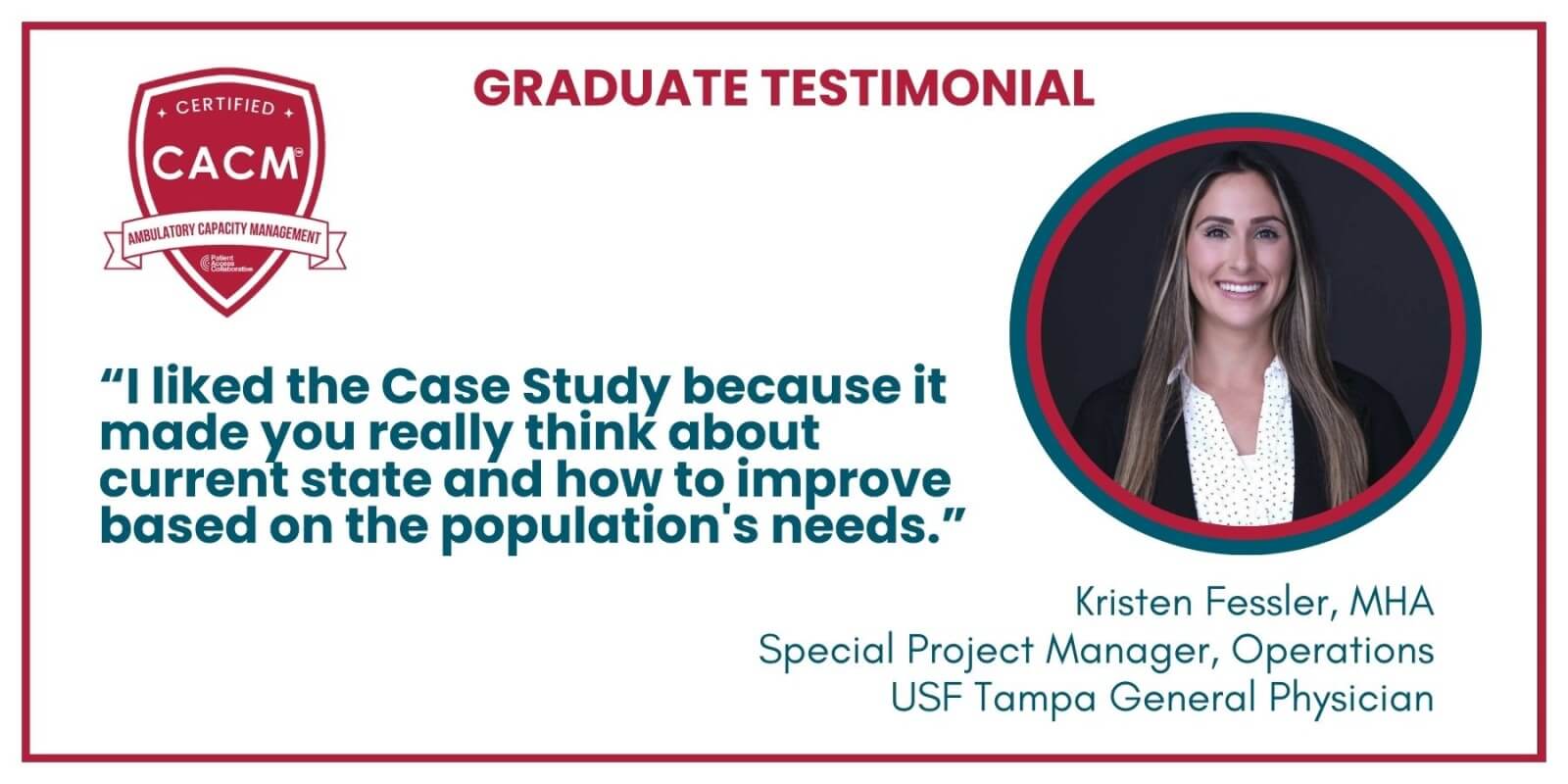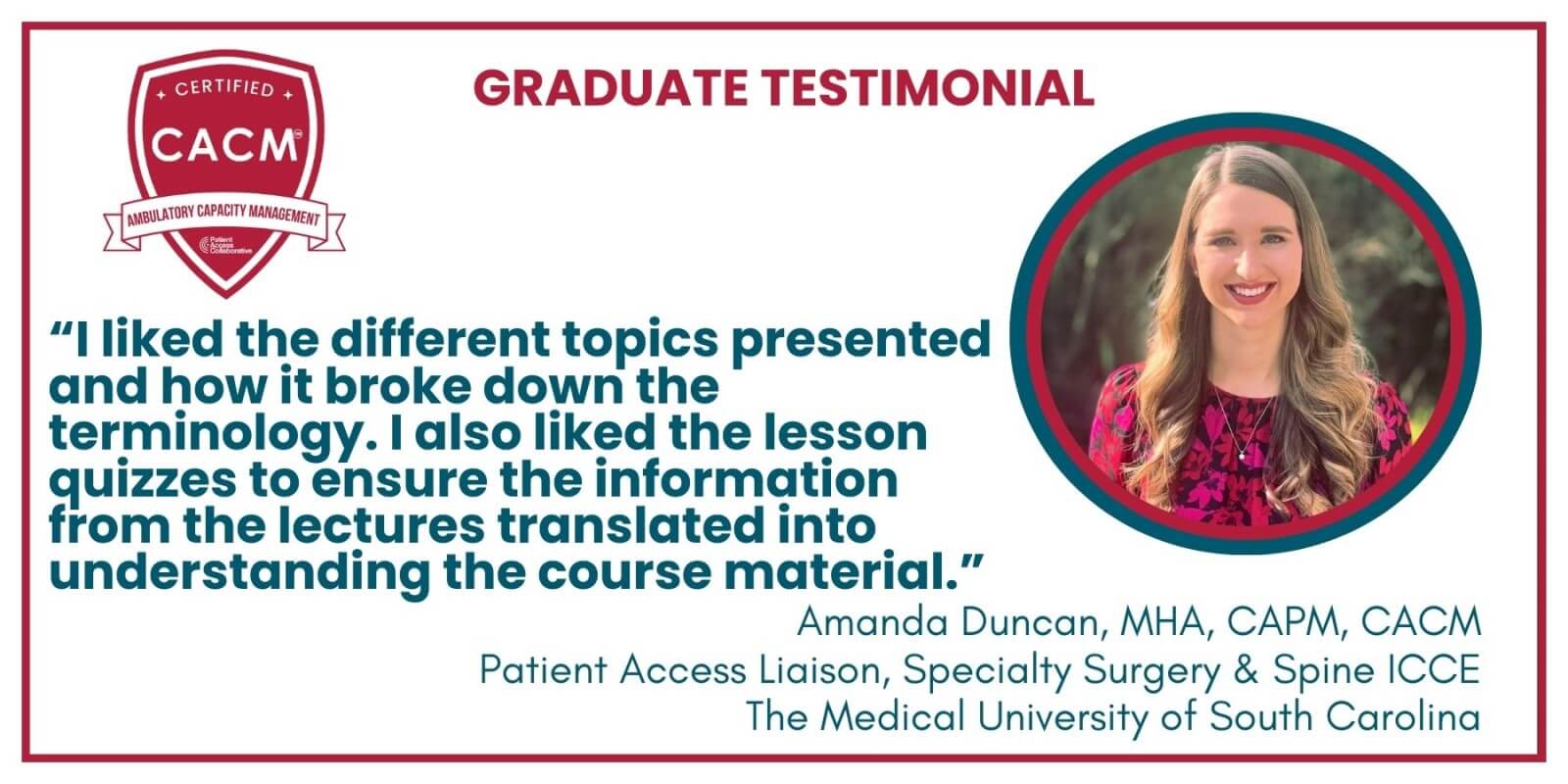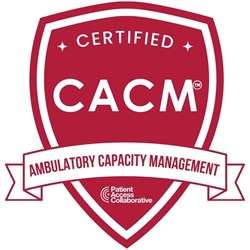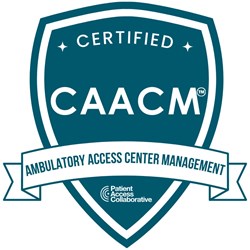Ambulatory Capacity Management Certification Course (CACM)
Patient Access Training

Ambulatory Capacity Management Certification Course (CACM)
The providers' time is the health system's most valuable resource - learn from industry experts and the Patient Access Collaborative leadership team how to approach managing capacity in the ambulatory enterprise.
About this Course
Matching provider resources to patient demand is a tricky equation to balance. How do you achieve equilibrium when the supply is fixed, the demand is hard to measure, and the systems are complicated? This is the challenge access leaders face when trying to manage capacity – no easy task! A new role of capacity management to support the ambulatory enterprise is emerging in health systems to focus on this very issue.

Let the experts help: the Patient Access Collaborative has been engaged in the complex field of ambulatory capacity management for more than a decade - this certificate course is designed to share our knowledge with you.
The Patient Access Collaborative is certified by the International Accreditors for Continuing Education and Training.
This Course includes:
- Seven to ten hours of asynchronous audiovisual modules developed and presented by industry experts
- Module assessments to test your knowledge
- Capstone case study to apply your new skills and knowledge to a real-world situation
- Synchronous virtual sessions with industry experts
- Certificate of completion
Experience Level Requirement
This course is designed to be suitable for a range of backgrounds and experience levels. No specific expertise or experience is necessary, however, familiarity with the ambulatory environment may aid in learning.
Syllabus
Ten Modules | Seven Assessments | One Case-Study | Quarterly Virtual Industry Expert Sessions
|
|
|
|
|
|
|
|
|
Course Faculty
Marcy Cohen | Senior Director, Ambulatory Capacity Management, Mount Sinai Health System
Lindsey Garcia | Manager, Patient Access, University of Utah Health
Hitan Kamdar, MS, MBA
Adrin Mammen, MS, MBA, FACHE | VP & Chief, Ambulatory Patient Access, Mount Sinai Health System
Jalana McCasland, FACHE, DSL | Vice President, Ambulatory Operations, VCU Health
Donny Nokes, MBA | Capacity Manager, Johns Hopkins Medicine
Kim Pacheco, MHA | Director, Patient Access | University of Utah Health
Chris Profeta, MPH | Senior Director, Patient Access Collaborative
Michael Scherer, MS-HSM | Access Manager, Templates & Capacity Management, Rush University Medical Group
Elizabeth Woodcock, DrPH, MBA, FACMPC, CPC | Founder and Executive Director, Patient Access Collaborative
Total Time
An estimated 12 to 20 total hours of education and simulated learning experience, to be completed at the learner's pace. The course must be completed within 12 months of registration.
Group Registrations
If you want to register more than one learner for the certification course, send an email to admin@patientaccesscollaborative.net with the full list of learner names and emails. Add the total number of courses you need (5 learners = 5 courses) to your cart and proceed with checkout. We will handle the registration from there.
Sample the Content
Justification
Need help convincing your health system to invest in this learning opportunity on your behalf? We created a letter of justification for you to download and customize for your needs.
Certification Justification Letter
Maintenance of Certification
To preserve the integrity of your new professional credential, the Patient Access Collaborative offers a maintenance of certification program. Click here to learn more about the program.
Questions?
Email us at admin@patientaccesscollaborative.net or call 404.272.2274 (ask for Elizabeth).
For consulting firms or other industry stakeholders, please contact us for pricing.
Any materials, publications, processes, or related works for the design and delivery of continuing education and training developed by the Patient Access Collaborative are owned by the PAC.
In embarking on this course, a reminder of your agreement upon registration that you will represent yourself as the learner and perform all assessments yourself; you will maintain this information for your individual use and not share it with others, and you will respect the confidentiality of the benchmarking data provided as such are trade secrets owned by the Patient Access Collaborative.


